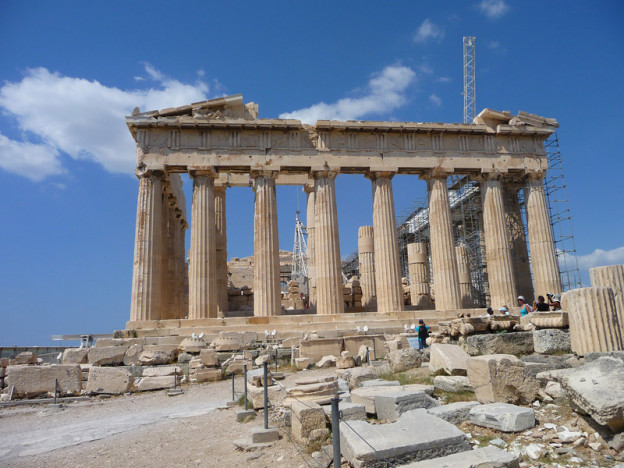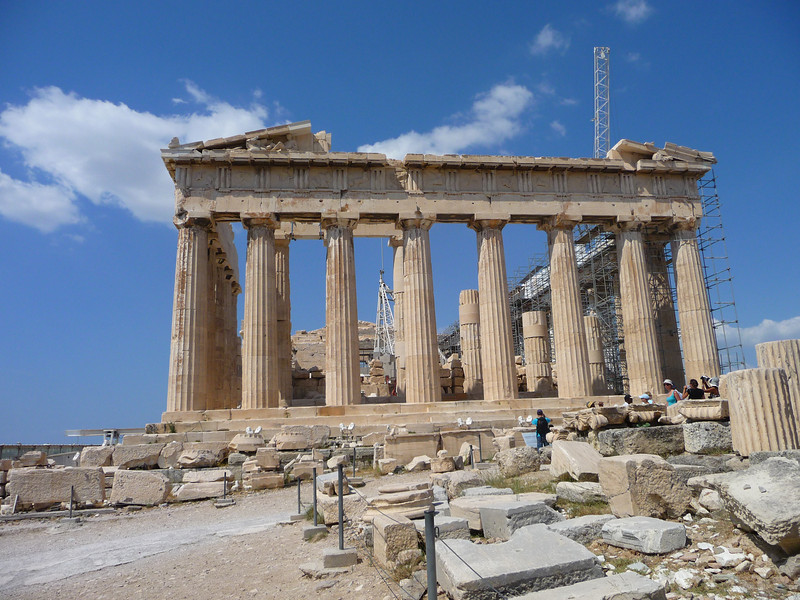Nicholas out grew his first pair of skates
Category Archives: history

The Motives of the Thieves of the Elgin Marbles
Nearly a year ago I wrote that the debate about the Elgin Marbles is really a debate about race
The folks in charge of the British Museum – whom I am sure have Greek friends – have been arguing for several centuries that the Greeks in Greece are not deserving of the marbles.
Heck the Marbles are known as the Elgin Marbles instead of the Parthenon Marbles…
The arguments boil down to one of the following
- You, Greeks in Greece, are no more related to the Greeks of Pericles than we the English. Essentially the Trustees are making the claim that they are the aribiters of another people’s history.
- You, Greeks in Greece, are incapable of taking care of these antiquities. The claim here is that we’re just not as clever or capable of destroying the marbles in the same the Board of Trustees are (see scouring of marbles in 1930’s)
- You, Greeks in Greece, are not worthy of these marbles. Don’t get me started
- You, Greeks in Greece, should be proud that we English are showing off your stuff! That the Greek heritage is made worthy because of what the English have done and the Greeks so desperate for approval should be grateful for our admiration for your culture
- You, Greeks in Greece, were a conquered people who have no rights what-so-ever. And the fact that you are now independent is irrelevant. We bought it from your conquerors and that’s that.
As a Greek the rage we feel towards the Board of Trustees and their supporters is because this is about respect and about history and not about marbles. It’s about having something valuable stolen and then the thief arguing we had no rights to what was stolen.
Every day that they stay there is an insult. And there will be no rest until they are returned.

We will Beat LA!
Nicholas three years ago came to the first game of the playoffs between the Sharks and LA and we got a picture next to the Zamboni.
That picture is our good luck charm. We beat LA that year with that improbable 6-5 game known as the Fiasco on Figueroa
After last year’s defeat, it was time to go deep into the tank of good luck charms. So I lost weight, and we got another picture of Nicholas and the Zamboni…

The Elgin Marbles and the Modern Greeks
 Argh, I really hate this debate.
Argh, I really hate this debate.
Greeks want the Marbles back, English say no, rinse repeat and recycle.
There is, however, an important subtext here that I find interesting that the author of the Guardian made:
Another reason is that the marbles belong to Greece. The temple itself was built in the 5th century BC by the city-state of Athens for Athena, its patron goddess, and it housed the tribute the Athenians received from the other city-states subject to them: hardly a symbol of Greek democracy or fellow-feeling. Athens ceased to exist as a Greek polis in the 6th century AD, well over a thousand years before the seventh Earl of Elgin removed them from the Ottoman empire. The nation of Greece dates back to 1830, 20 years after Elgin finished his dirty work, and 14 years after the British state turned them over to the British Museum, whose trustees are now the legal owners of the sculpture. It is hard to see what the modern nation states of Greece and the UK, or the issue of ownership, really have to do with the question of where the Parthenon sculptures are best displayed.
The debate here, really, is about who the Greeks are. The Greeks believe that their ancestors built the Parthenon. This isn’t some abstract concept in Greece. We speak a language that is trivially derived from what was spoken at the time of Pericles. Our national identity is wrapped in the following saying:
When our ancestors were building the Parthenon yours were painting themselves blue.
The Guardian is making the claim we’re not the same Greeks. That we’re just a bunch of dudes who happened to be in the same geographical area that the Marbles were and our claim to ownership is dubious at best.
And that to me is an interesting point of view. I’m not even sure it’s wrong. But it does reflect the underlying bias that has been behind the Elgin Marble debate. A subset of the advocates of keeping it in England are basically saying: This doesn’t belong to you because you’re not related to the ancient Greeks. And the Greeks are saying: You’re wrong.
I find it fascinating how in Europe we can have these kinds of debates, where one country’s journalists can so … bluntly … deny another country’s heritage.
So why is this denial so important? Because if you make this denial, then Greek history is not the history of a civilization that spans 2500 years, but one that spans 180. And if you can do that about the Greeks, you can do that about anyone.
At some level, this is a racist point-of-view. You Greeks are not worthy of the Marbles, because you’re not those Greeks – you’re just a bunch of people who magically showed up in the same geographical location speaking the same language who preserved those monuments for no good reason. The racial argument is appalling. And it’s the kind of thing I expect from Europeans.
Elgin stole, what to Greeks is, our heritage. And then to have the Guardian deny our heritage, is well… odd.
This debate about the Marbles isn’t about placement, it’s about whether the Greeks are Greek, and what it means to be Greek, and the unwillingness of the UK establishment to acknowledge Greeks for being Greeks and that lack of recognition will continue to be the reason why this debate will never go away.
And the fact that journalists in the UK still don’t get it is, well, disappointing if not surprising.
Markov
So I am sitting at home watching the game between SJ Sharks and Phoenix Coyotes.
And the announcers are saying that there are no defensemen in the East that can move the puck other than Zdeno Chara.
Well, what about Markov?
This guy gets no respect.
He’s got 55 points.
He’s the quarterback of the best power-play in the NHL.
He’s the lynchpin of the transition game of the best offense in the NHL..
And he’s considered worse than Zdeno Chara?
Give me a break…
Movie review: 300
When I was growing up my aunt Helen, on my mother’s side of the family, felt it was her personal obligation to make me a proud Greek. I was brought up with tales of the glory of Athens and the heroism of Greeks. We, Greeks, I was told had withstood centuries of invaders and preserved our essential Greekness. Of the stories, four stood out. The first was the story of how General Metaxas told the Italian Ambassador: No, when asked if Greece would become a protectorate of Italy in 1940. The second was the Persian defeat at Salamis by the Athenians. The third was Leonidas’ response to Xerxes demand that he give up his weapons: Molon Lave (translation: come and take them). The fourth was during the Greek war of independence the phrase: Better one hour free than a hundred a slave. These are the cherished stories of my youth. And there was a time, in my life, that they inspired me.
So when I saw the film being previewed I was filled with dread. I am not so demanding that the film be a documentary. After all 300 is supposed to be entertainment and the true facts of what happened are unknowable. I was hoping for two things: to be entertained and the film be at list true to the spirit of the tale. After The further adventures of Hercules, Xena: The Warrior Princess, Troy and Alexander the Great that seemed a ridiculously high bar.
On both accounts, entertainment and veracity, the film exceeded my expectations.
The film is fun. It’s a good old fashioned over-the-top blood fest. There is the usual collection of ridiculously attired villians, scantily clad heroes, music, and slow-motion decapitations. There is the usual collection of witty heroic one-liners (including Molon Labe). There is some T and A, but I think the female and male gay population will enjoy more of the T and A than the straight male community.
The film is mostly true to the spirit of the tale and to the Spartans. The Spartans really did throw the disfigured and maimed children down wells. They really did take the children into camps at the age of seven. They really did fight as a phalanx. Their wives really did say: Come back carrying or on your shield when the men left for battle. The battle did really last three days. The Spartans did thwart the Immortals. A solitary Spartan did leave the battle to tell the tale.
As a Greek brought up on the stories of Leonidas the story rang true.
However, there was one fact that irritated me. Now remember, I am an Athenian. And in my version of the story, Leonidas’ heroic defeat was important because it bought the Athenian Navy enough time to trap the Persians at Salamis. And it was at Salamis that the Persian invasion was defeated. The battle of Platea was just some mopping up of the remnants of Xerxes army. Furthermore, from my perspective the victory of the Athenian fleet was what created democracy, Leonidas’ victory created militarism.
In this movie version of the story, Leonidas’ defeat is followed by a Greek victory in Platea. We are meant to believe that it was the Spartan war machine that defeated Xerxes. There is no mention of the Athenians and their defeat of Xerxes’ Navy.
sigh
In spite of the omission of Athenian role, I strongly recommend the film.


